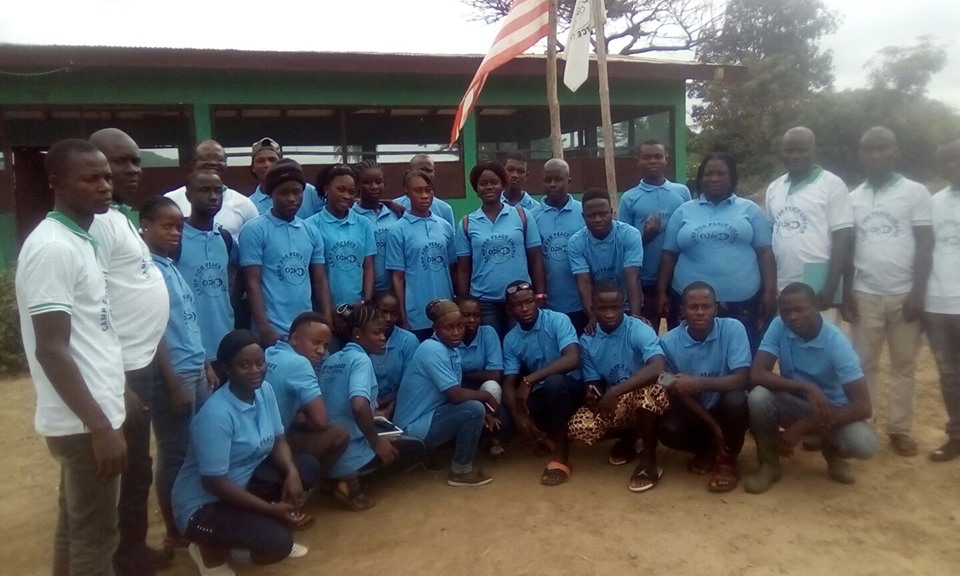


CAMP FOR PEACE LIBERIA COMMENCES ITS 9TH VOCATIONAL TRAINING CYCLE:
On Tuesday, December 3, 2019, Camp for Peace Liberia launched its 9th vocational training program and 3rd agriculture cohort, which enrolled 30 youths (males and females) from different parts of the country. The 2020 vocational program will run for 11 months and will emphasize various aspects of agriculture training, strategies, and skills development. The program was launched with a strong message for young people to embrace agriculture as one of the last potential opportunities for Liberians to improve their social and economic development.
Speaking during the orientation on Tuesday, Mr. B. Abel Learwellie, Executive Director, strongly stressed the importance of reforming Liberia development patterns. Mr. Liberia emphasized that vocational programs for both educated and uneducated youths will have a fast-tracking impact on Liberia’s social-economic and sustainable development. He, therefore, admonished the participants to take their training seriously, stressing that only Liberians can develop Liberia. On a separate note, Mr. Learwellie outlined the different training components. He said the 2020 training would include animal husbandry encompassing pig production, goat raising, poultry, fish ponds, cows, etc. He named other areas of the program to add rice and vegetable production, palm nursery and management, cocoa nursery, etc. Mr. Learwellie emphasized the raising of these animals and the production of crops and vegetables will surely boost food security in Liberia and enhances the Liberian economy from a state of dependency to a state of sustainability. He also used the occasion to call on the Liberian government and development partners, including UN Agencies, EU, and others, to support Camp for Peace and other local efforts in the country. He extended his deepest gratitude to the funders, the Steel Workers Humanity Fund of Canada, the Healing Exchange Project with Lois Kunkel and Agnes Struik, Ann Beckett, the New York Metropolitan Synod of the ELCA and the Center for Sacred Studies. Others include Marilyn Satterfield, Rev. John Becke, Columbia University School of International Affairs, among others. He said all these institutions and people are supporting the program either through financial, and with moral and emotional support.
Also speaking at the program was Mr. Moses Kpakuyou and Hon. Ben Gorlema who spoke in separate remarks. Mr. Kpakuyou outlined the importance of Agriculture in the burgeoning economic and challenged the students to take their training seriously. He also mentioned that agriculture is the basis upon which the Liberian economy depends. He told the students that agriculture would change their lives from deprivation to variability if they take it as a career and business. For his part, the Commissioner, Hon. Gorlema first extended his most profound appreciation to the sponsors who continue to develop the youth and changing their stories into success. He encouraged the students to take their studies and training seriously. “I will always support you as long as you will here and willing to learn. I will provide you the security and moral support as I have always done” Hon. Gorlema promised. Hon. Gorlema said his dream is to see the Farmer Resource Center turned into a variable agriculture training institute. He hopes to see youths from all walks in Liberia to learn and immensely contribute to the development and enhancement of food security in their communities when they return.
The Camp for Peace Agriculture training methods is very different from traditional schools and colleges. Camp for Peace does not provide an academic certificate, nor do they depend on chemical inputs for food production. Their training takes place through the simple acts of living in the community, working together as a team on an organic farming process, and at the same time, sharing with others. That is the reason why they target both uneducated youths, commonly referred to as “one eye,” and semi-educated youths. Their goal is to improve the living standard of their beneficiaries and participants, irrespective of their social, economic, education, and religious background. They feel the pains that most youths in Liberia today are vulnerable and lack the opportunities to meet the basic needs of livelihood. Therefore, they entice them to agriculture through education, training, and mentorship.

0